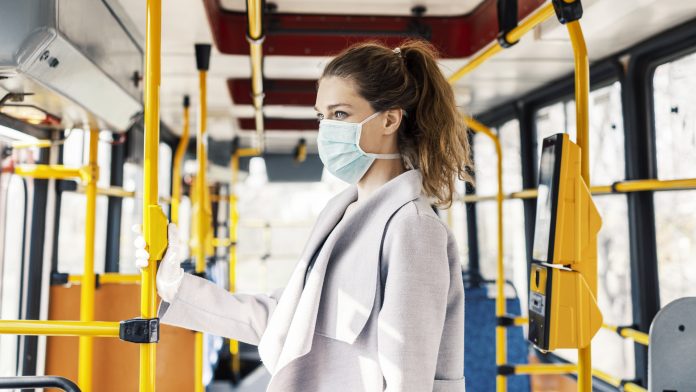Anne Grünkorn, Managing Director of LogPay Mobility Services, speaks to The Innovation Platform about the influence of COVID-19 on the digitisation of public transport and LogPay’s role in the mobility market.
Over the past few months, we have dealt with questions relating to the following issues: how can we motivate more people to switch from private cars to public transport; how can accessibility in public transport be increased; and how important is electric mobility for future mobility to achieve better climate protection and sustainability? These questions stem from the fact that public transport should be attractive, safe, secure, reliable and affordable, as well as being the main mode of passenger transport in both urban and inter-urban travel environments.
In Germany, the major international trade fair for intelligent solutions in public transport (IT-Trans), was recently cancelled. This comes at a time where people’s freedom to travel throughout Europe has been restricted, and contact bans and curfews have also been imposed as a result of the spread of COVID-19. People are no longer going into the office to work, and business trips are being held through the medium of telephone and video conferences. Children and young people no longer drive to school but are instead being home schooled. Families are no longer going on holiday, instead they are staying at home and spending their holidays on their balcony.
As a result, there are now empty trains on public transport, Saturday timetables are becoming standard and multiply cancellations of train tickets. The effects are felt by private and public transport companies and mobility service providers – in short, the whole transport industry alike are being affected. However, public transport plays an important, systemically relevant role in maintaining the necessary infrastructure. The population must be guaranteed reliable mobility, even now. This applies in particular to employees in systemically important professions such as health care, rescue services, trade and freight transport, who must continue to be able to make their way to work.
Boosting the digitisation of public transport
However, the closure of schools and the loss of passengers to protect public health will result in a considerable loss of revenue. This effects the whole chain – public transport and related industries. In addition, there will be higher costs for cleaning and health protection, and more vehicles will be needed for considerably fewer passengers to enable the 1.5m distance requirement to be met.
Labour organisations and associations are now demanding financial support for the transport companies affected, as in Germany the income of public transport companies depends by over 50% on fare revenues. Now, due to the crisis, these revenues have declined by up to 85%, which means the loss of ticket income becomes unabsorbable. The existence of the companies is acutely threatened, and the industry supplying solutions for public transport is affected in the same manner.
Despite this however, a crisis does also hold opportunities for the entire industry. The digitisation of public transport is now inevitably receiving a boost. For example, by eliminating the possibility of buying tickets from the bus driver, people are switching to alternatives of buying tickets through vending machines or apps. The mobile payment gets a boost from the widespread request to pay as cashless as possible. Due to the fact that very view people use public transport as a result of the government restrictions all over Europe, it is now time to think about how the public transport industry can support the transition in ensuring ‘healthy travel’. The obligatory usage of respirator mask (even hand-made) that is currently being discussed in Germany and other EU Member States is one major step forward and is very much welcomed.
Information inside the public transport vehicles to leave space between passengers and information on platforms when the next train, metro or bus is arriving for waiting passengers in order to distribute passengers better is equally necessary. The public transport sector needs to redefine their rules and to make them public so that people are not afraid anymore to use public transport. Each Member State has to be vocal to their public transport passengers how they can ensure healthy travel during the corona virus pandemic.
How can public transport benefit from the opportunities offered by digitisation, and how can co-operation among stakeholders help?
When purchasing tickets online, the payment process is playing an important role for customers. Also, the latest changes to tariff systems (such as fixed-to-kilometre or time-based pricing), will also affect this payment process, along with user-friendliness and the security of the payment options, as well as a variety of payment methods that are important for customers. With mobile payment processing continuing to grow, a secure payment process is key. More and more public transport companies and mobility providers are offering mobile apps for easy and flexible access, while more and more customers use mobile devices for ticket purchases and payments for other mobility services.
This offer satisfies the growing demand for an easier, faster, and safer transaction because of mobile phone contactless payments. In addition to this, it is needed to combine travel times, usage of individual subway cars to spread passengers in order to keep social distancing and payment. For example, it could help to ensure social distancing by submitting a ticket which sets the time, marking clearly the number of the individual subway cars or buses and stops passengers when the limit of passengers is reached per vehicle. Assistance on the platform should help people to find their way.
Online payments or app-based systems is a complex, multi-level process that processes sensitive data. A full-service provider, specialised in the mobility market (such as LogPay), protects against fraud and data misuse and, at best, assumes the del credere risk, receivables management and offers legally flexible models. Hence, the payment service provider is the interface between the transport companies, the other mobility providers and the customers. Here at LogPay, we are ready to develop our system in order to allow new health protection measures to allow public transport to play their role and not to run almost empty as it is now in at least all urban areas in Germany.
The apps of the public transport companies need to evolve to offer a number of further security features. Today they offer optimised routes, transfers and the choice of the means of transport but thanks to digitisation we could enhance this and look for new ways on how to support for public transport authorities and companies. When stakeholders co-operate, it will be possible to bring together the data of travel time, route selection, tariffs and reservation for selected trips and selected place and then to purchase the suitable ticket for one seat or one selected subway/tram cars into one app. Today this is the case in long-distance transport (such as Deutsche Bahn) but corona shows us it is necessary in regional and urban public transport too. This data can be evaluated in a matter of seconds through today’s IT technologies and made available to citizens for their protection when using public transport. This information could be accessed in any of the cities or the regions in Europe through the digital sales channels. As a result, this would guarantee the success of the public transport apps also in this crisis times. In this way, the crisis may even encourage and accelerate the advance of digitisation in public transport. Incidentally, the goal of an environmentally friendly and affordable mobility system will come closer.
Nobody can say when exactly we will overcome this crisis despite all the scientific simulations and governmental efforts to keep us safe through all sorts of measures mainly by locking us in and even if it is not yet foreseeable what exactly the long-term consequences for the public transport sector will be, we can at least start to make an effort for free movement of passengers. If we now try out the combination of seat reservation and new payment, implement passenger counting and develop new access systems, this will also help us on our way out of the worldwide pandemic and its economic effects on the whole passenger transport industry.
LogPay: about us
LogPay Financial Services GmbH is a subsidiary of the Volkswagen Financial Services located in Eschborn/Frankfurt, Germany. As a factoring company and payment service provider, we buy receivables of the freight transport, land transport and of the public transport and other mobility markets. We issue or own LogPay fuel & charging (electric vehicles) card to hauliers and consumers in Europe. With an annual turnover of over €3bn transaction volume, we are one of the top market leaders in claims management. As LogPay Mobility Services we offer our contract partners (such as public transport companies and other mobility service providers) a full set of financial and technical services with a long-standing experience in Germany.
Through LogPay Transport Services GmbH, we offer both our business partners and transport companies a wide range of services: The LogPay Fuel and Service Card allows customers to pay for fuel and other roadside services in Europe; for tolling there is no need for any cards in most of the European Toll Domains as On-Board Units are available either for each single toll domain or for interoperable use in several toll domains.
If you would like to get to know us, contact us and we can chat on the phone or get together at least virtually as meeting personally at the InnoTrans in Berlin in September 2020 and at the IT-Trans in Karlsruhe in December 2020 may not be possible.
Anne Grünkorn
Managing Director
LogPay Mobility Services GmbH
+49 (0)6196/8012 224
anne.gruenkorn@logpay.de
https://www.logpay.de/EN/
Please note, this article will also appear in the second edition of our new quarterly publication.









